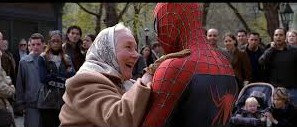On Sunday August 24th (today, if you’re reading this on the day I post it), I shall be heading to the stage in a village hall for what has become a yearly concert. They were twice-yearly once, but that’s not possible these days. It’s been a weird year since the last one. There have been the highs of passing my PhD and the lows of a really shit time with bipolar. When I hit the stage (“hit” makes it sound a little more dynamic than it actually is) this time I shall be singing some old favourites for the first time since my Dad passed away two and a half years ago. It’s odd singing songs I know he loved, and strange knowing that he won’t hear or see them – not even on videotape.
The day before the show is always a case of “killing time” and not being able to settle to anything constuctive. So, I sat down in front of the TV and watched the blu-ray of Spiderman 2 from 2004. The excitement of my Saturday nights hold no bounds. It’s not exactly a great film, it has to be said, lacking the pace of the first one in the series, just plodding on from one set-piece to another. However, I did find it interesting given the fact I had been thinking about my Dad, for the film, rather surprisingly, seems to be more honest than most about grief.
The film is set two years after the first, but Peter Parker and his aunt are seen still mourning the loss of his uncle. It’s an oddly moving element of an otherwise rather vacuous film, not least because of the genuine and touching way in which these scenes are portrayed. All too often, grief and mourning is dismissed in a film or a book or a play as something very temporary. Someone dies, people cry, the funeral takes place, everything returns to normal. In a space of two weeks life is back on track. That, of course, is bullshit. It’s not the way it works. Things never really go back to how they were. We get back into a routine, for sure. But it’s not the same routine, because there’s always someone missing from it.
Film, at least popular, commercial film, very rarely acknowledges this. And neither does popular TV or fiction. When was the last time you watched Midsomer Murders and saw someone really grieving? It’s hard to tell why such basic human emotions are missing. After all, most of us like to be able to “identify” ourselves with the character on the screen. Of course there are arthouse films that are all about grief and mourning and loss. But there are certain subjects that are avoided in more commercial ventures, it seems, simply because the makers don’t really know how to deal with them.
Over the last couple of weeks, there has been much discussion about mental health issues on TV and the social media. These are issues that, again, we rarely see portrayed in TV or film dramas. Like mental health issues, it appears that death and grief is still a taboo – something that people feel remarkably uncomfortable discussing. And with both of these issues, it’ s a highly individual experience. No two people grieve in the same way. But, if we were to go by Hollywood filmmaking, people just don’t grieve at all. They wake up one morning, about a fortnight after the event, and everything’s fine again. It’s not. I miss my Dad now more than I did in the weeks after he died over two years ago. Is that normal? I don’t know. I don’t care. It’s my normal.
Is it wrong that these emotions are absent on our cinema and TV screens? I’m not sure about that, but it certainly seems to be an easy option – and something we don’t necessarily notice until we’re suddenly, and unexpectedly, confronted with these scenes in the most unlikely film. And Spiderman 2 is, certainly, the most unlikely film to deal honestly with the fact that we miss those no longer with us for the rest of our lives and not just until the funeral is over.
